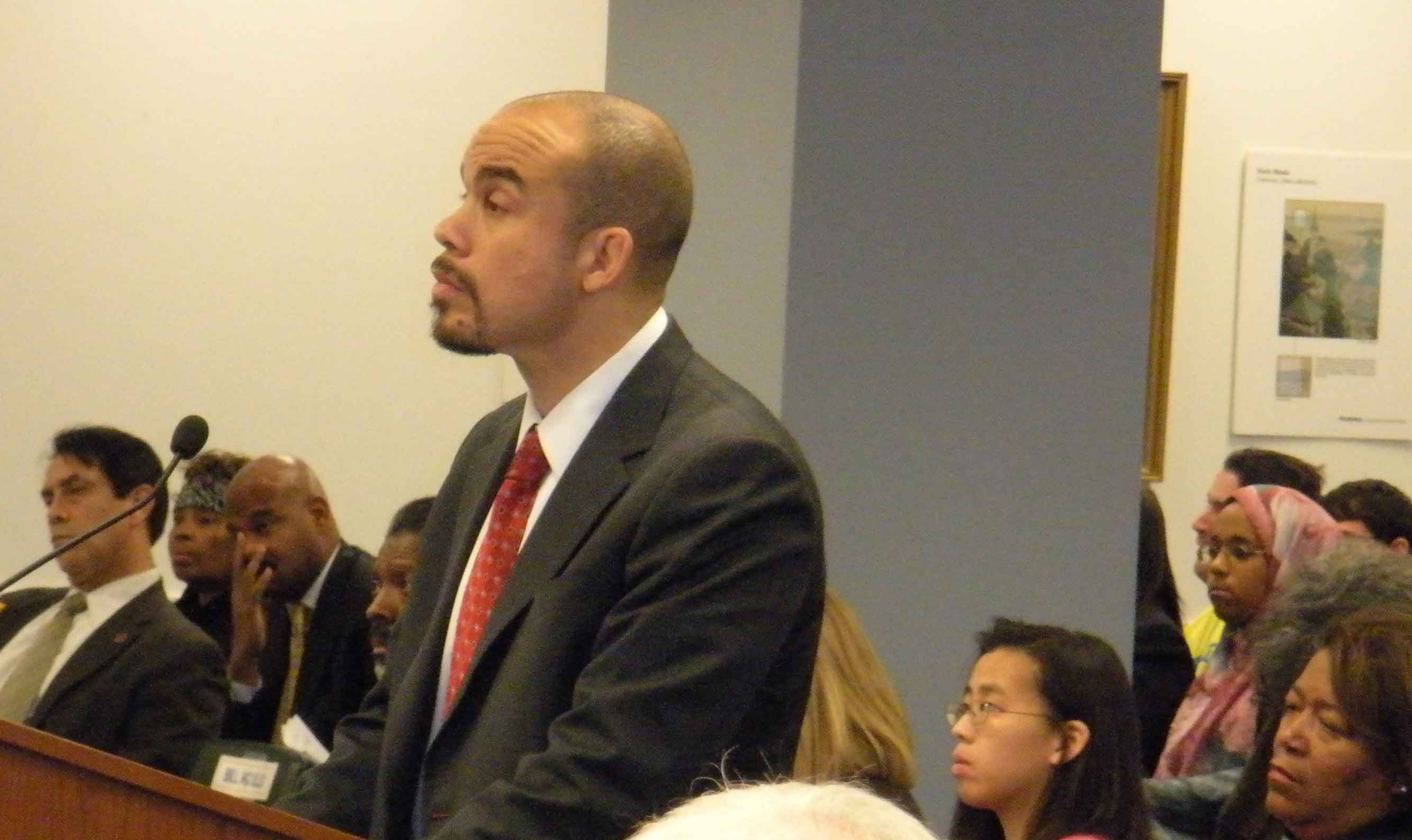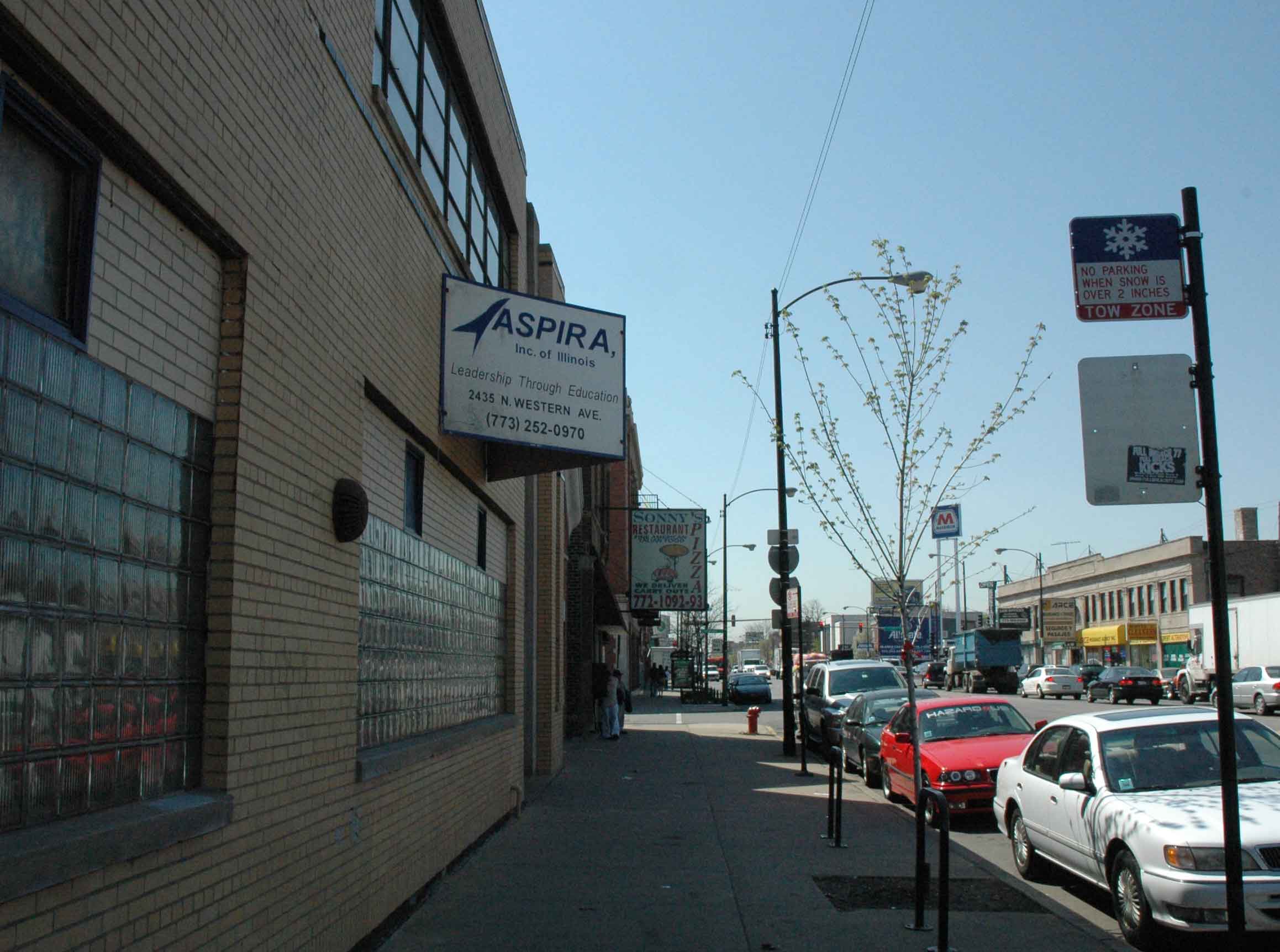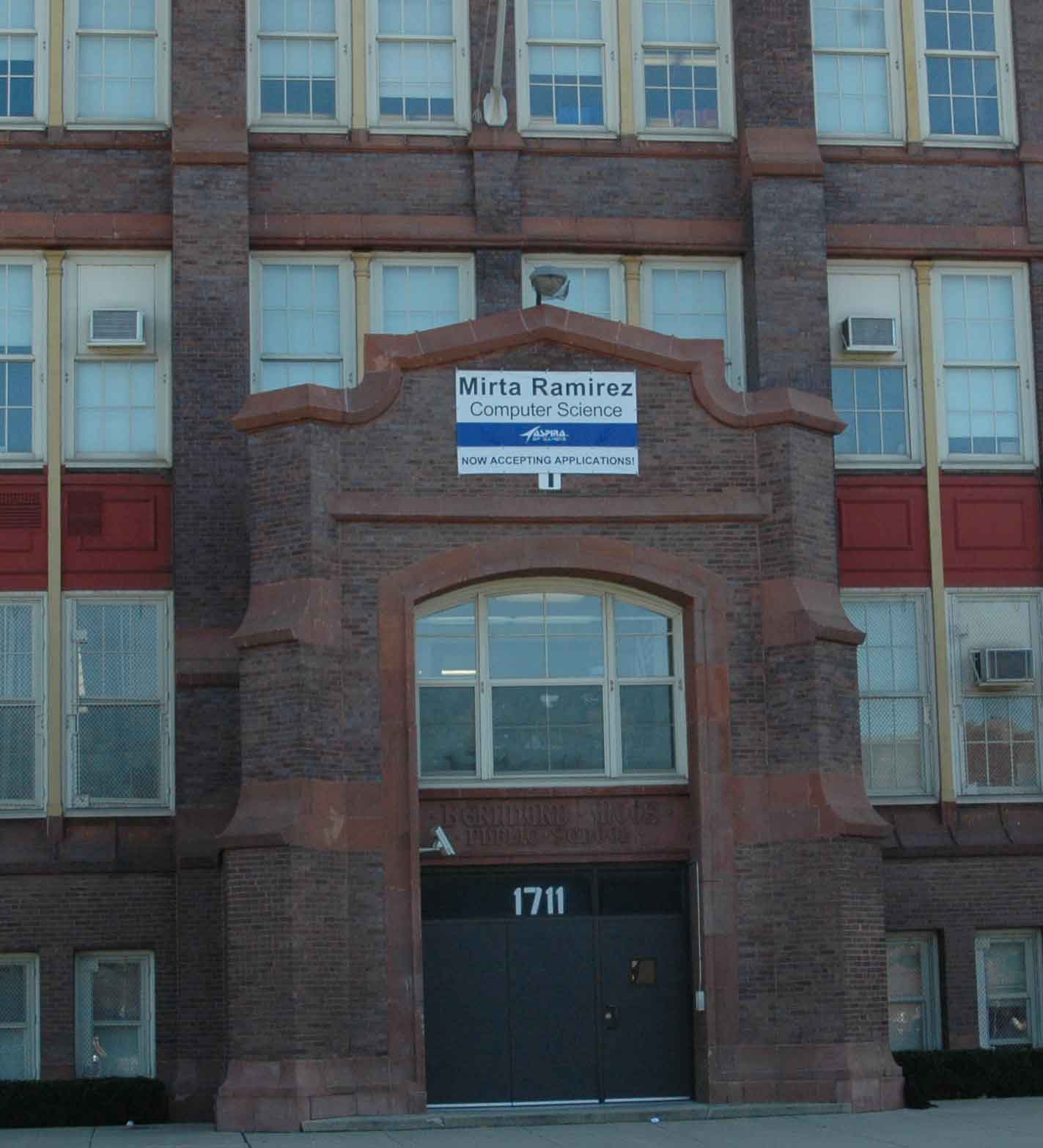Poor Charter Performer in Line for Millions More... Arne Duncan's Chicago record shows he is lying when he says he wants 'good' charter schools
Note: This is the second in a series of articles that takes a close look at the controversial Aspira charter school operator and its strong political ties that allows it to expand despite its dismal performance and criminal behavior.
 Before he was abruptly fired by Chicago Schools CEO Ron Huberman, Joshua Edelman (above) had been overseer for the largest destruction of public schools in Chicago history. Above Edelman speaks at the November 18, 2008 Board of Education meeting, a month before Arne Duncan was announced as Barack Obama's choice to be U.S. Secretary of Education. During his years as "Chief Officer, New Schools" under Duncan, Edelman covered up every problem brought to his attention regarding the city's controversial and often corrupt charter schools. Edelman's cover ups extended well beyond facilitating the expansion of the Aspira charter schools, and included ignoring abuse cases at two clout-heavy charter school operators and miserable performance at virtually all of the city's charters. Substance photo by George N. Schmidt. When Education Secretary Arne Duncan tells everyone he is not in favor of charter schools, but he is favor of "good charter schools" ŌĆö heŌĆÖs a liar.
Before he was abruptly fired by Chicago Schools CEO Ron Huberman, Joshua Edelman (above) had been overseer for the largest destruction of public schools in Chicago history. Above Edelman speaks at the November 18, 2008 Board of Education meeting, a month before Arne Duncan was announced as Barack Obama's choice to be U.S. Secretary of Education. During his years as "Chief Officer, New Schools" under Duncan, Edelman covered up every problem brought to his attention regarding the city's controversial and often corrupt charter schools. Edelman's cover ups extended well beyond facilitating the expansion of the Aspira charter schools, and included ignoring abuse cases at two clout-heavy charter school operators and miserable performance at virtually all of the city's charters. Substance photo by George N. Schmidt. When Education Secretary Arne Duncan tells everyone he is not in favor of charter schools, but he is favor of "good charter schools" ŌĆö heŌĆÖs a liar.
The proof is Aspira Charter Schools ŌĆö a corrupt but politically powerful organization that even the Office of New Schools which heavily promotes charters agrees is doing such a poor job of educating its students that it issued a highly critical report.
Despite this ŌĆö and the fact that Aspira is facing a federal lawsuit for strip searching three female students in addition to falsifying attendance records and illegally changing grades ŌĆö when Duncan was head of the Chicago Public Schools, he lobbied heavily to not only renew their charters, but force an elementary school on the north side to open its building to the Mirta Ramirez Aspira Charter High School.
 While the attention of the public is diverted to other examples of "corruption" by Chicago's daily newspapers, one of the longest running corruptions in Chicago is the "Aspira Mirta Ramirez Charter High School" (variously called a "computer" and "math science" high school during its more than eight years of existence). In 2006, while still located in a dirty warehouse at 2435 N. Western Ave. (above), Mirta Ramirez announced to the world that it had the "highest" Prairie State Achievement Exam (PSAE) scores in the public school system (excluding the magnet high schools). The claim based on those scores was used by Aspira to market its programs to working class families, most of them Spanish-speaking. But even at the height of its claims, Mirta Ramirez was actually cooking all the books and using clout to dodge any accountability. Between 2006 and 2009, standardized test scores for Mirta Ramirez dropped every year. In 2006, Mirta Ramirez claimed a composite PSAE score of 31.7. In 2007, Mirta Ramirez claimed a composite PSAE score of 24.5.
While the attention of the public is diverted to other examples of "corruption" by Chicago's daily newspapers, one of the longest running corruptions in Chicago is the "Aspira Mirta Ramirez Charter High School" (variously called a "computer" and "math science" high school during its more than eight years of existence). In 2006, while still located in a dirty warehouse at 2435 N. Western Ave. (above), Mirta Ramirez announced to the world that it had the "highest" Prairie State Achievement Exam (PSAE) scores in the public school system (excluding the magnet high schools). The claim based on those scores was used by Aspira to market its programs to working class families, most of them Spanish-speaking. But even at the height of its claims, Mirta Ramirez was actually cooking all the books and using clout to dodge any accountability. Between 2006 and 2009, standardized test scores for Mirta Ramirez dropped every year. In 2006, Mirta Ramirez claimed a composite PSAE score of 31.7. In 2007, Mirta Ramirez claimed a composite PSAE score of 24.5.
By 2009, Mirta Ramirez claimed a composite PSAE score of 17.6. Yet the Board of Education covered up on any complaint brought by parents or teachers about Aspira, and blew the whistle on whistle blowers so that Aspira could fire anyone who tried to bring out in public the lies that were receiving millions of dollars in public money via Chicago's charter schools funding. Substance caption and photograph by George N. Schmidt. [The Mirta Ramirez test scores have been in a free fall over the past several years despite its press materials claiming they rank third among Chicago charter schools. Their PSAE scores fell from almost 32% of its students passing the test in 2006 to only 17.6% this year.]
So what happens to a failing charter school in Chicago?
They get to keep on failing with more taxpayer money.
On July 13, 2009, Illinois Governor Pat Quinn announced that he just signed a capital bill providing an additional $12 million to Aspira to build more schools. The capital bill is stimulus money President Barack Obama and Duncan are using to force states to open more charter schools.
But after the Office of New SchoolsŌĆÖ highly critical report surfaced at the June 2009 Chicago Board of Education meeting, it appears CPS and Aspira have taken a temporary step back.
Jaime Guzman ŌĆö who was just named the Office of New Schools interim chief after Josh Edelman was fired ŌĆö told Substance that Aspira has withdrawn its two charter school applications for this year. (Note: this decision was apparently made right after this reporter asked questions about the critical Aspira report at the summer Board meeting).
The CPS Office of New Schools issued a report called the "Charter School Renewal Site Visit" in November 2007, in which members of its team and an outside educational consultant called "School Works" observed documents, visited classrooms, and conducted interviews with Aspira administration, faculty, students and parents.
The summary of the report states: ŌĆ£There are few ASPIRA-wide procedures and or policies ŌĆö new principal support, personnel, discipline and purchasing, for example ŌĆö that uniformly guide practice and future development.ŌĆØ
 By 2006, Arne Duncan was ready to turn over half the newly renovated Moos Elementary School building (above, at 1711 N. California Ave. adjacent to Chicago's Humboldt Park) to Mirta Ramirez for the relocation of the school. Duncan's administration suppressed every report of unsafe and unsanitary conditions at the Western Ave. site, at times claiming that the "success" of the school (as measured by PSAE score claims) was all that mattered. The parents and community at the Moos school protested the idea of squeezing them in a building which had just received a new addition and questioned the wisdom of putting a "high school" (Mirta Ramirez, above) inside an elementary schools so that high-school-age students were on the same block as the elementary children all day. Arne Duncan rammed through the Mirta Ramirez move after Aspiral, like a number of the charter organizations, packed a couple of hastily assembled "community meetings" to be able to claim that the "community" supported the move into Moos. Substance caption and photo by George N. Schmidt. According to the 2007 report, Aspira ŌĆ£is not adequately resourced to serve the special education students.ŌĆØ The report also notes there is a shortage of special education teachers, where one special education teacher is a full-time substitute. And during interviews, the teachers told the evaluation committee they feel unprepared to teach special education students, with one teacher remarking, "I donŌĆÖt know which students in my class have IEPs (individual education plan for students with disabilities).ŌĆØ
By 2006, Arne Duncan was ready to turn over half the newly renovated Moos Elementary School building (above, at 1711 N. California Ave. adjacent to Chicago's Humboldt Park) to Mirta Ramirez for the relocation of the school. Duncan's administration suppressed every report of unsafe and unsanitary conditions at the Western Ave. site, at times claiming that the "success" of the school (as measured by PSAE score claims) was all that mattered. The parents and community at the Moos school protested the idea of squeezing them in a building which had just received a new addition and questioned the wisdom of putting a "high school" (Mirta Ramirez, above) inside an elementary schools so that high-school-age students were on the same block as the elementary children all day. Arne Duncan rammed through the Mirta Ramirez move after Aspiral, like a number of the charter organizations, packed a couple of hastily assembled "community meetings" to be able to claim that the "community" supported the move into Moos. Substance caption and photo by George N. Schmidt. According to the 2007 report, Aspira ŌĆ£is not adequately resourced to serve the special education students.ŌĆØ The report also notes there is a shortage of special education teachers, where one special education teacher is a full-time substitute. And during interviews, the teachers told the evaluation committee they feel unprepared to teach special education students, with one teacher remarking, "I donŌĆÖt know which students in my class have IEPs (individual education plan for students with disabilities).ŌĆØ
The report added that the administration is unclear about how to handle this problem. The 2007 report was suppressed until 2009, when a copy of it was obtained by Substance. Only after Substance brought the problems outlined in the report up at a meeting of the Chicago Board of Education did officials at the Office of New Schools withdraw, temporarily at least, proposals for the further expansion of Aspira's charter schools in Chicago. At the same time, the Office of New Schools, which maintains one of the most comprehensive Web sites for its "Renaissance 2010" programs, has refused to make public either the Aspira report or the reports on any of the other Chicago charter schools that were undertaken during the same period of time.
Charter schools have more autonomy ŌĆō or less regulation - than public schools and do not have to have fully certified teachers in the classrooms. One teacher told Substance that she noticed some of her special ed students who had serious behavior problems was because they were not being serviced.
In terms of its English language learners (ELL), Aspira is not adequately resourced to serve them, the report states.
The Renewal Site Visit team found little evidence of teams of teachers with Spanish language proficiency to support students.ŌĆØ And during interviews, leaders and teachers revealed that there were little to no materials available in Spanish.
One teacher in AspiraŌĆÖs Early College Charter High School told Substance she had one student who could speak very little English but received no language support during the entire year.
The special education students comprise 16 percent of AspiraŌĆÖs total population while English language learners comprise 13 percent, the report noted.
An even more troubling finding was safety ŌĆö a key selling point charter schools promote. Focus groups in the study reported ŌĆ£mixedŌĆØ feelings about their safety.
Students spoke about an assault between a male and female student at one school, in which the police and an ambulance came to the school, but the incident was never discussed with the students. Students also talked about gang recruitment within some campuses and fights in the hallways and in the park. Students said they did not feel security was doing its job, adding that there was a lack of consequences for student misbehavior, according to the report.
One theory about the breakdown in security is that privatized security guards who do not work directly for the Board of Education are paid much less, thus compromising the quality of their services.
The Aspira leadership team was criticized heavily throughout the report. The report stated AspiraŌĆÖs leadership team provides little direction to its campuses, no clear evaluation criteria and does not effectively encourage or accept input from its stakeholders.
ŌĆ£During interviews, leaders and teachers indicated that there is a ŌĆślack of trustŌĆÖ and ŌĆśdisrespectŌĆÖ for faculty at the ASPIRA leadership level. One teacher noted, ŌĆśWe are not treated like adults ŌĆ” it is a factory worker mentality here.ŌĆÖŌĆØ Parents told the evaluators that it is very difficult to get information from the central office. One parent noted that ŌĆ£no one seems to be answering the phone.ŌĆØ
Before the Aspira Mirta Ramirez charter school moved into the Moos Elementary building at DuncanŌĆÖs request, a group of students were ready to revolt when Aspira president Jose Rodriguez refused to respond to their questions about whether or not they would have a school to attend the next year because their current building was structurally unsound. The students eventually staged a sit-in the central office before someone addressed their concerns.
A Sun Times article earlier this year entitled: ŌĆ£Mom: I don't send my kids to school to be strip searchedŌĆØ noted that one of the Aspira schools was on its third principal in its first three semesters. The report added that Aspira might be moving too fast. One person said, ŌĆ£You canŌĆÖt have them open two more schools next year when you canŌĆÖt even get this one right.ŌĆØ
[Note that Aspira had put in applications for more charter schools at the time of this report two years ago, but then withdrew them.]
When AspiraŌĆÖs strip search allegations hit the headlines and nightly news broadcasts earlier this year, Duncan told the Sun Times via email from Washington D.C. that, ŌĆ£We investigated the allegations thoroughly; weŌĆÖve held ASPIRA accountable, and theyŌĆÖve taken strong action to correct the situation.ŌĆØ
The accountability lies in a report titled ŌĆ£ASPIRA Charter Renewal Agreement.ŌĆØ Board of Ed head lawyer Pat Rocks forwarded Substance the renewal agreement.
The Agreement stipulated that Aspira must by May 1, 2008 clearly identify a Freedom of Information Officer, 75% of Aspira teachers must be Illinois certified and 100% of the teachers must be NCLB (No Child Left Behind) certified with a plan that outlines the steps Aspira will take to hire these teachers.
The Aspira school board must submit to the Office of New Schools a ŌĆ£rigorous plan and rubric for evaluating the executive director on a consistent basis.ŌĆØ
Aspira must also clearly define an operational structure to support its campuses which includes robust systems for hiring and firing faculty and staff and support for middle school and high school campuses.
To address the special education problems, the charter school must hire additional academic support staff with special education expertise, hire full-time special education staff at each campus, and develop a comprehensive professional development plan to assist teachers in addressing the social and emotional needs of students with disabilities.
To address the English Language Learner problems, Aspira must hire additional academic support staff with ELL expertise, hire full-time staff certified to teach ELL at each campus and develop an English as a Second Language curriculum aligned to the core subject areas.
ŌĆ£If the Charter School fails to meet these conditions within the designated timeframes,ŌĆØ the agreement states, ŌĆ£the Board may elect to i) revoke the Agreement, ii) pursue all other remedies available under the Agreement, or iii) not renew the Agreement in the future.ŌĆØ
While stellar public schools throughout the city are being closed based on questionable enrollment figures or test scores, the Board of Education and Duncan in Washington are continuing to promote a charter school that is rigging test score data, showing declining test scores, changing grades, falsifying attendance records, strip searching children during discipline disputes and terrorizing teachers who blow the whistle.
[Next: The third part in this series will take a look at the questionable tactics Aspira is using to entice children away from their neighborhood schools and sign up with Aspira.]’Ż┐
Final edited version of this article posted at www.substancenews.net September 23, 2009, 5:00 p.m. CDT. If you choose to reproduce this article in whole or in part, or any of the graphical material included with it, please give full credit to SubstanceNews as follows: Copyright ┬® 2009 Substance, Inc., www.substancenews.net. Please provide Substance with a copy of any reproductions of this material and we will let you know our terms ŌĆö or you can take out a subscription to Substance (see red button to the right) and make a donation. We are asking all of our readers to either subscribe to the print edition of Substance (a bargain at $16 per year) or make a donation. Both options are available on the right side of our Home Page. For further information, feel free to call us at our office at 773-725-7502.

